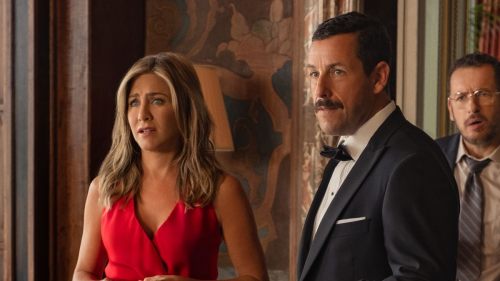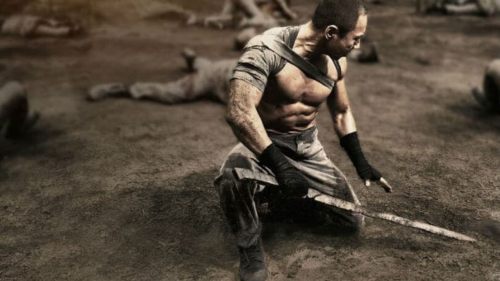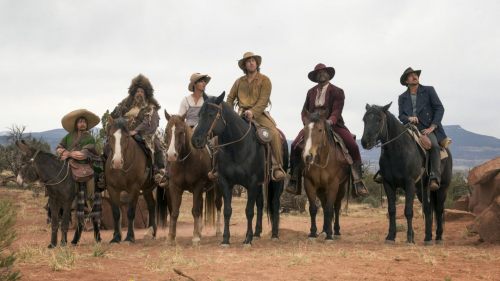THE END OF THE F***ING WORLD Review: Much More Than What It Looks Like
The premise of the new Netflix series, The End of the F***ing World (originally made for Channel 4 in the UK) doesn’t sound like something I’d enjoy. Rebellious teen girl ropes loner teen boy into running away from home with her; teen boy steals his dad’s car and goes with her, because he’s waiting for the right moment to kill her.
But TEOTFW is one of the best TV shows I’ve watched in years – a masterwork of storytelling with a true, clear-eyed understanding of the medium. I watched the whole thing twice in a matter of days (which isn’t actually too difficult – the eight episodes clock in at about 2 hours and 45 minutes). I haven’t been able to stop thinking about it. It’s one of those things that becomes intensely yours, burrowing its way behind your ribs and sticking there.
The story does start out as I described: James (Alex Lawther, who you might recognize from Black Mirror) tells the audience that he’s convinced he’s a psychopath. His left hand is a mass of scars left over from when, as a child, he put his hand in a deep fat fryer in order to try to feel something. His face is blank, and apart from his well-meaning and shallowly cheerful father, he is completely alone. He carries a hunting knife strapped to his leg and thinks about killing something “bigger” than the animals he’s already dispatched.
Enter Alyssa.
Alyssa (Jessica Barden) is fed up with the kids at school and with her negligent mother and creepy stepfather. She approaches James at school with the world’s best pickup line (“I’ve seen ya skatin’. You’re pretty sh*t”). She’s brash and loud and kind of destructive – the seeming emotional yin to James’ yang (or, vice versa?).
But there’s a moment in the first episode where everything tilts; Alyssa is wandering around James’ house, looking at his photographs, and picks up one of his mother (who we later find out has died). “You look like her,” Alyssa says, careless and matter-of-fact. James blinks rapidly and swallows, a shadow of an unreadable emotion moving across his previously unexpressive face. And this is when I began to understand what I was really in for.
TEOTFW digs into its two protagonists as they peel away layer after layer from the other person’s self-constructed shell, and it’s absolutely magnificent. Each character is their own person, with their own distinct arc, but they do change each other as the show goes on.
Alyssa isn’t a manic pixie dream girl sent to “save” James from a fate of psychopathy (she’s more of a goblin nightmare girl, which is overwhelmingly endearing to me). I love getting to see sharp, angry girls onscreen. She’s rude and standoffish and impulsive and wildly unrepentant. Barden captures that singular teenage tone that lets you know every goading phrase is a challenge, meant to shock you into a reaction. Yes, I’ve just said that, it conveys, defiant. What are you going to do about it?
As the show unfolds, we get to see Alyssa open up – she doesn’t quite become softer, but she allows herself to shed some of her protective layer. She’s a girl who’s been hurt again and again by her family, and it’s clear that this is partly why she’s built up her uncaring cool-girl exterior. The entire final arc of the series is hers, and we get to see her try, and fail, to tamp down her optimism at the prospect of reconciling with her father, who left when she was eight.
Alyssa is a shock to James’ system – and she’s the shock he needs to jumpstart his own journey as he realizes that maybe he’s not a psychopath after all. James’ emotional growth is more outwardly visible than Alyssa’s – it’s the more obvious of the two character arcs the first time you watch the show. Lawther is an unbelievably talented actor; the change that we see on James’ face is incremental, but you realize by the end of the show that he looks like a completely different person. He moves from small twitchy smiles to genuinely soft grins, and as he starts to let himself feel things, you see it reflected across his face. By the end, he even moves differently – still awkward, but more assured. The way the emotion blooms across his face honestly takes your breath away.
When I first saw the show’s description, I was worried. I wasn’t about to stomach another idolization of male psychopaths – especially in our current environment. But TEOTFW couldn’t be a farther cry from this. It shows us a boy who, through attention and kindness, begins to shed and unlearn the toxic masculinity that he had let fester for his entire adolescence. He starts out closed off and, as Alyssa puts it, “a bit dead.” Violence (against animals, as explained in the first episode) is his only form of expression. When you add in the Britishness, he’s the very definition of repressed. He doesn’t allow himself to mourn or rejoice or live. But Alyssa’s brashness catches him off guard, forming a small crack in his façade that grows and grows until he cannot hold onto the pieces anymore. (And until he becomes the kind of person Alyssa can rely on in her arc – sort of.) Over a decade of unfelt emotion comes washing over him
On the whole, TEOTFW tends to treat subject matter like this as matter-of-factly as Alyssa treats everything. Alyssa is bold about consent (although she’s pretty forceful with James); two female detectives (Wunmi Mosaku and Gemma Whelan) have a clear romantic history. The show doesn’t point to these things to illustrate what a good job it’s done. It just does them.
On a technical level, TEOTFW is a perfect clockwork device, self-contained and purposeful; every aspect, from script to cinematography to editing to music to costume, works alongside and relies upon each of the others. All of the production details enhance the best aspects of the story and character development. It’s so clear that series creator Jonathan Entwistle cared about every detail.
The dialogue walks that satisfying line between profound and realistic, and the storytelling is tight – the longest episode is 22 minutes long, so no part of each chapter can be extraneous (thanks to the talented Charlie Covell – she wrote the whole thing). It’s told in a dual narrative, which is something I’ve only ever seen before in novels with alternating chapters. Both James and Alyssa talk over the scene in voiceovers to illuminate what they’re thinking. Voiceovers are tough to pull off, but TEOTFW does it brilliantly; the timing ranges from hilarious to heartbreaking as the two, unknowingly, bounce off of one another. (Eg: “What should we do?” Go home. “Do you want to go home?” Hang on, does he want to go home?) And the attention to detail is shockingly precise and heavy here: all of Alyssa’s thoughts are in present tense. James’ are in past. You only really realize the implications of this tense dissonance at the end.
The physical landscape shifts as the two characters drive, feeling more like the US than the UK sometimes. It opens up as James and Alyssa do, from forest and suburb to fields and ocean, moving from cooler to warmer colors. The characters ditch their phones in the first episode, which leaves us with a timeless sort of feeling. James and Alyssa have to change their clothes multiple times as the show continues, and each shift marks a change in both of their emotional journeys. We see this same opening up with James when Alyssa cuts his hair and reveals more of his face (and his growing range of emotion). The music is integral to the landscape of the show, too. It’s a soundtrack by Graham Coxon with guitar riffs that shift from bluesy to angry, interspersed with a collection of decades-old, tonally dissonant songs.
There is so much more I could say about TEOTFW, but I’ll close with this: The End of the F***ing World is a crime drama and a teenage road trip story, but above both of those things, it’s an ode to the tenderness and fragility of human connection. It’s about what people mean to each other.



